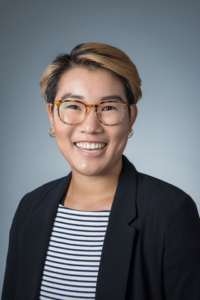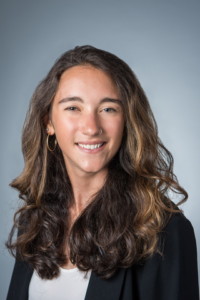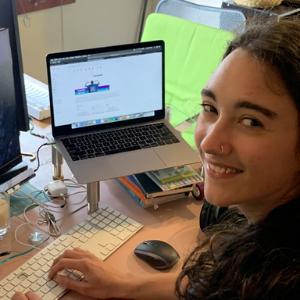Duo Develop New Breastfeeding Resources
Breastfeeding is often a challenge for women who are affected by hypohidrotic ectodermal dysplasia (HED). The National Foundation for Ectodermal Dysplasias (NFED) sought to publish educational resources to help these women. That’s when two genetic counseling students stepped in. Read how they volunteered for the NFED and what our families ended up teaching them.
Nicole Choy
Hailing from Hawaii, Nicole Choy moved to southern California to pursue her educational goals. She earned a master’s degree in genetic counseling from the Keck Graduate Institute (KGI). In early 2020, her program director reached out to the students to tell them about an opportunity to volunteer with the NFED. Nicole took this prospect and began her volunteer work with the NFED by writing new educational materials.

“I was excited about volunteering with the NFED,” Choy said. “As a genetic counseling student, I entered this field because I want to empower and advocate for patients and families living with genetic conditions. I was thrilled to have the opportunity to create something that would allow me to do just that.”
Learning About Ectodermal Dysplasia
Nicole explained that genetic counseling students are exposed to many different genetic conditions, but their education is limited to clinical descriptions and textbook images. Volunteering with the NFED gave Nicole the opportunity to work with NFED staff and learn more about the needs of women affected by HED.
“I would highly recommend that any aspiring healthcare professional volunteer with an organization like the NFED,” Choy said. “Empathy is a skill that can be learned and cultivated, and there is no better way to do this than to give your time. I am grateful to be able to contribute my time and skills to this organization.”
Elsa Balton

Another valuable volunteer is Elsa Balton, a genetic counseling student from KGI. She graduated from Western Washington University in Bellingham, Wash, with two bachelor’s degrees, one in cellular and molecular biology and one in Spanish. Before beginning graduate school, Elsa worked as a medical assistant in an OB/GYN clinic and ran a local youth sailing program. She decided to pursue genetic counseling because she’s interested in women’s health and reproductive care. In the fall of 2019, she started volunteering with the NFED.
“I worked on creating educational materials about breast feeding for mothers with hypohidrotic ectodermal dysplasias and carriers of X-linked HED,” Balton said. “Many of these women face challenges with breast feeding and may feel alone or unsupported. I hope that my work can help women find the resources they need and help validate their struggles.”
Gaining Deeper Understanding
Elsa’s program director at KGI prompted her and her fellow students to work with the NFED. She knew that volunteering would be a great way for her to become more involved with helping patients as a student. Through this opportunity, Elsa experienced powerful moments.
“When I was doing research for my project, I read posts written by women with HED and XLHED about their experiences with breastfeeding,” Balton said. “Reading these stories helped me feel more connected with HED/XLHED patients and gave me a deeper understanding of what it is like to struggle with breast feeding as a new mother.”
A challenging part of Elsa’s project was revising text to make sure that it was easy to understand, and that it was accessible to all patients.
“I wanted the project to be specifically targeted towards patients, not providers,” Balton said. “I wanted to make sure that patients of all literacy levels could easily understand the text.”
An Impact Worth Sharing
Volunteering with the NFED has affected Elsa’a life in a positive way. As a first-year genetic counseling student, she has yet to begin her clinical rotations where she will work directly with patients. Working with the NFED allowed her to feel like she is already making a difference in patients’ lives.
“Everyone I have worked with through NFED has been incredibly kind and supportive,” Balton said. “I have felt highly valued as a volunteer and have learned a lot from this experience. They were also very willing to accommodate my busy schedule as a student.”
Elsa’s volunteer work made her come to the realization that regardless of a diagnosis of HED, every woman has a different experience.
Nicole and Elsa, thank you for all of your hard work!
(Editor’s Note – The NFED plans to share the breastfeeding resources later this fall.)
